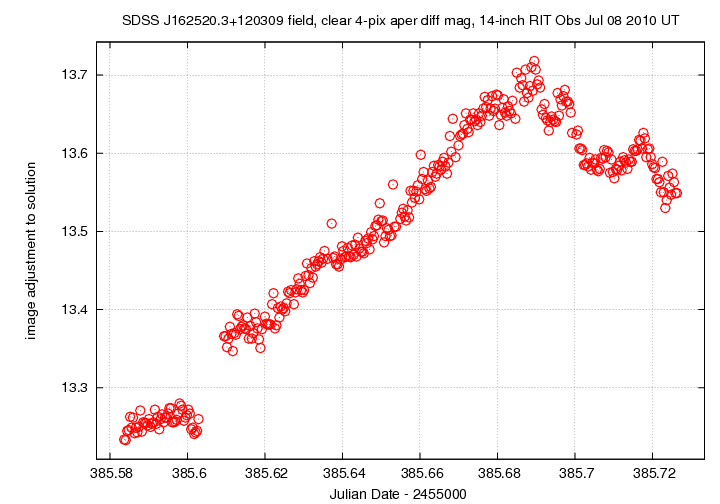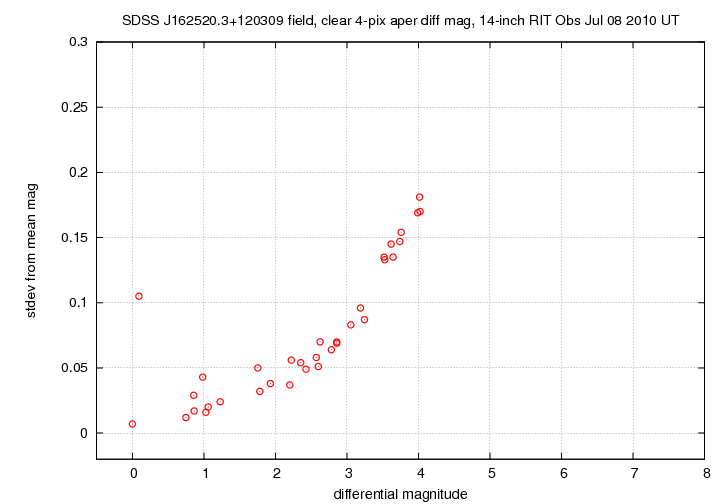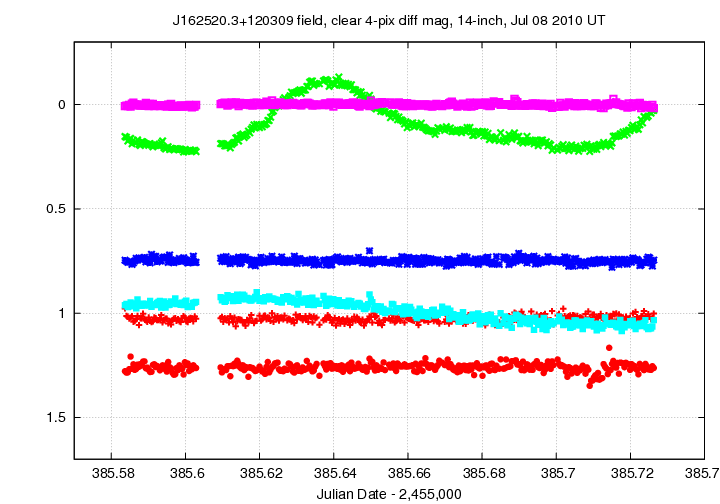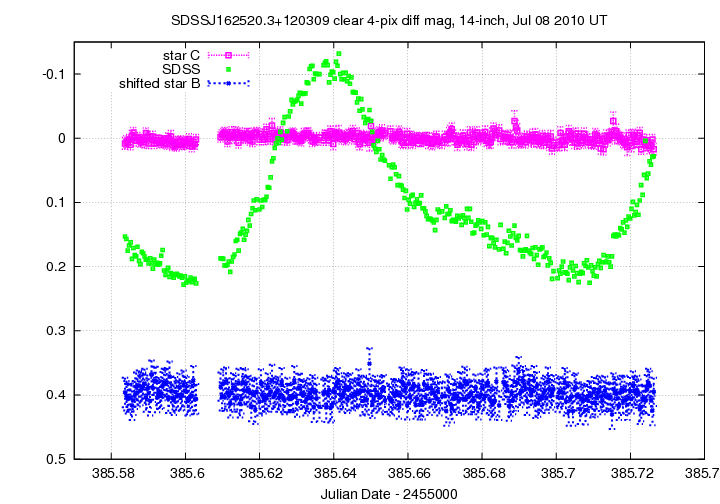
On the night of July 7/8, 2010, I observed the cataclysmic variable star SDSS 162520.3+120309 which is currently in outburst.
The setup was:
Notes from the night
This is a chart of the field based on one of my images last night.

The chart has several of the brighter stars in the field labelled with letters, just to keep me straight as I perform the reductions. Star P is in the Tycho-2 catalog, but it's so bright that it is saturated in my measurements. The star labelled "C" is in the USNO B1.0 catalog:
name RA Dec B R
-----------------------------------------------------------------------------
USNOB1.0 1019-0299359 16:25:25.739 +11:59:21.18 14.27 13.24
14.46 13.30
-----------------------------------------------------------------------------
The star labelled "X" showed two brief dips in its light last night, but I saw no such dips tonight. Its light curve (the bottom one in the plot below) was noisy near the end, but no sign of real variation.
On the other hand, the star labelled "D" does show a long, gradual drop in light of about 0.10 mag over the course of several hours. Its light curve is shown in light blue points below. I marked it as "variable" and did not include its light in the ensemble reference set.
The star labelled "D" is
name RA Dec B R
-----------------------------------------------------------------------------
USNOB1.0 1020-0302581 16:25:24.333 +12:01:19.26 15.80 14.36
15.91 14.07
-----------------------------------------------------------------------------
I measured the instrumental magnitude of each star with aperture photometry, using a radius of 4 pixels = 4.2 arcseconds and sky defined by an annulus around each star. Following the procedures outlined by Kent Honeycutt's article on inhomogeneous ensemble photometry, I used all stars available in each image to define a reference frame, and measured each star against this frame.
One output of the ensemble solution is the value of the zero-point of each frame relative to the others. In the graph below, I plot this zero-point as a function of time. Note the small dip in zero-point near the end of the run; the field culminated at JD 385.60 or so, so this is during the setting phase.

Below is a graph of the scatter in differential magnitude versus magnitude in the ensemble solution.

The floor of this diagram corresponds to a scatter of about 0.010 mag, which is rather mediocre; this may be due in part to the haze, and in part due to the rotation of the field halfway through the observing run. The target is the second-brightest star, at differential magnitude 0.1. its scatter of 0.106 mag (larger than last night's scatter) is due to the changes in its light. The star at differential magnitude 0.98, with scatter 0.048 mag, is the one labelled "D" in the chart above.
Light curves for selected stars (SDSS162520 and stars A - D, as well as X) in the field are shown below. The target is shown by light green crosses.

The star "X" is shown by red-orange circles near the bottom of the graph. No obvious dips tonight. The star "D" is shown by light blue points -- it does clearly decrease over the course of the run.
Here's a closeup of the variation in SDSS162520 and two comparison stars.

I've made a table of the measurements themselves, with three different flavors of time. The differential magnitudes from the ensemble solution have been shifted so that star "C" in my chart, USNOB1.0 1019-0299359, has value 13.8; that should be close to its V-band magnitude.
Here's the start of the table.
# Measurements of SDSS162520+120309 made at RIT Obs, Jul 8, 2010 UT, # by Michael Richmond, using 14-inch Celestron and SBIG ST-9E CCD. # Exposures 30 seconds long, no filter. # Tabulated times are midexposure (FITS header time - half exposure length) # and accurate only to +/- 1 second (??). # 'mag' is a differential magnitude based on ensemble photometry # using a circular aperture of radius 4.2 arcseconds. # which has been shifted so USNOB1.0 1019-0299359 has mag=13.8 # as a very rough estimate of its V-band value. # # UT_day JD HJD mag uncert Jul08.08370 2455385.58370 2455385.58725 13.953 0.009 Jul08.08409 2455385.58409 2455385.58764 13.957 0.009 Jul08.08446 2455385.58446 2455385.58801 13.975 0.009
Last modified 7/07/2010 by MWR.